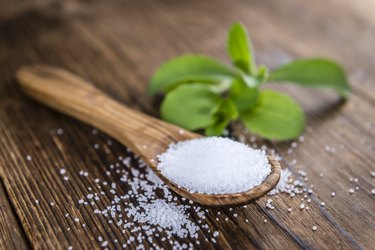
There are plenty of sugar alternatives on the market that promise to sweeten foods and drinks without adding as many calories as sugar.
One such product, stevia, is popular because it offers zero-calorie sweetness and is derived from plant sources. But just because stevia doesn't have calories doesn't mean it is without side effects.
Video of the Day
Video of the Day
If you're wondering if stevia can cause diarrhea, we'll examine the sweetener, its ingredients and what it can do to your body.
What Is Stevia?
While stevia — also known as Stevia rebaudiana — is a plant, the stevia you add to your cup of coffee is much different than the type that grows in leaf form.
Stevia products, including Truvia, Enliten and PureVia, are made of rebaudioside A (Reb-A), a refined stevia leaf extract, according to the Mayo Clinic. Reb-A sweeteners can be purchased in liquid, powder or granulated form.
Reb-A is a form of steviol glycoside that's about 200 times sweeter than table sugar and is typically combined with other sweeteners, according to June 2019 research in the Proceedings of the National Academy of Sciences (PNAS).
Truvia is a mixture of Reb-A and erythritol (sugar alcohol), and Stevia in the Raw is a combination of Reb-A and dextrose (glucose).
Stevia may also sometimes be combined with maltodextrin, sodium saccharin, sodium cyclamate or aspartame. While stevia is generally recognized as safe (GRAS) by the FDA, it's possible to experience certain side effects.
How Much Stevia Is Too Much?
The Acceptable Daily Intake (ADI) is the amount of a substance that people can consume in food or beverages on a daily basis during their whole life without any appreciable risk to health, per June 2015 research in Nutrition Today.
The Joint Expert Committee on Food Additives (JECFA) has set the ADI of stevia extract at 12 milligrams per pound of body weight — or about 10 packets of stevia for a 150-pound person, according to the study.
Side Effects of Stevia
The scope of risks associated with stevia are still not fully understood by the scientific community. A September 2017 analysis in Nutrition Journal examined the health outcomes of non-nutritive sweeteners and found that not enough studies had been conducted to make a judgment about stevia's overall safety.
What science does know more about is the side effects associated with other materials. Because commercial stevia products are often a mixture of stevia extract and other types of sweeteners, it's important to consider the known side effects of those other sweeteners.
Xylitol, erythritol, hydrogenated starch hydrolysates, isomalt, lactitol, mannitol, sorbitol and maltitol are all different types of sugar alcohols.
Sugar alcohols are commonly associated with side effects including bloating, gas and diarrhea, according to Yale New Haven Health. Research also suggests that these ingredients can cause a "laxative effect."
So, if it includes sugar alcohols, it's possible that a stevia product can lead to bloating, gas and diarrhea, and may have a laxative effect.
Truvia, a product marketed as a natural, stevia-based sweetener, contains stevia and erythritol, which is a sugar alcohol. For this reason, it's possible that Truvia could lead to diarrhea, bloating and gas, and it's also possible that consuming Truvia could have a laxative effect.
So, does stevia cause diarrhea? It's not possible to say for sure.
Still, we know there are many types of sweeteners available, so it can be confusing as to which ones have the most potential of triggering diarrhea. The International Foundation for Functional Gastrointestinal Disorders lists lactose and sorbitol as potential diarrhea triggers, but does not include stevia in that list.
- PDR for Herbal Medicines, 2nd Edition; Joerg Gruenwald, PhD
- Memorial Sloan-Kettering Cancer Center: Stevia
- FDA: Has Stevia Been Approved by FDA to be Used as a Sweetener?
- International Foundation for Functional Gastrointestinal Disorders: Chronic Diarrhea: Could it Have an Everyday Cause?
- FDA: Is Stevia an 'FDA approved' sweetener?
- Mayo Clinic: "What is stevia? I've heard it's good for weight control."
- PNAS: "Molecular basis for branched steviol glucoside biosynthesis"
- Nutrition Today: "Stevia, Nature’s Zero-Calorie Sustainable Sweetener"
- Yale New Haven Health: "Eat Any Sugar Alcohol Lately?"
- Nutrition Journal: "Health outcomes of non-nutritive sweeteners: analysis of the research landscape"
- Stevia In the Raw: " FAQ"
- FDA: "Corn Sugar"
- Critical Reviews in Food Science and Nutrition:"Nutrition, Health, and Regulatory Aspects of Digestible Maltodextrins"
- International Foundation for Functional Gastrointestinal Disorders: "Managing Diarrhea"
Is this an emergency? If you are experiencing serious medical symptoms, please see the National Library of Medicine’s list of signs you need emergency medical attention or call 911.